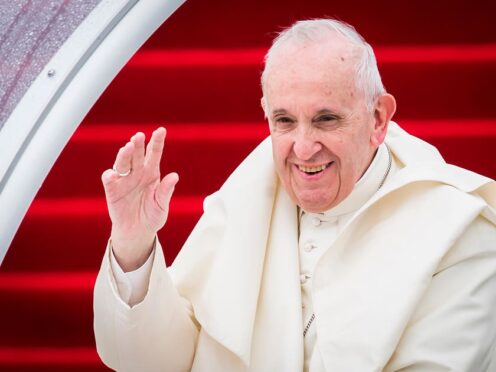
An apology from the Pope over the use of language seen as homophobic has been welcomed by a UK Catholic LGBT+ group.
He was widely reported by Italian media to have used the term “frociaggine”, considered derogatory, when answering no to a question on whether gay men should be admitted to seminaries to train for the priesthood.
The reports sparked criticism, with a London-based LGBT+ Catholic group describing the language as offensive and disappointing.
In a statement on Tuesday, Vatican spokesman Matteo Bruni said: “The Pope never intended to offend or express himself in homophobic terms, and he extends his apologies to those who were offended by the use of a term that was reported by others.”
Martin Pendergast, secretary of LGBT+ Catholics Westminster Pastoral Council, said: “Given the media frenzy that there has been around this, I think it is very significant that an apology has come so swiftly and he clearly recognised not just that he is sorry for those who might have been hurt but also that it was homophobic language.”
The remark was said to have been made behind closed doors to Italian bishops on May 20.
Italian is not the Argentine pope’s first language and he is said to often speak informally, using slang at times in private.
Mr Pendergast said the Pope “should be more careful about how he phrases things, particularly in these kind of off-the-cuff remarks.
“I think he tends to use these slang words without understanding the ramifications they can have.”
He said the remark will not be a step back for relations for the church and its gay members and questioned the way in which the comment had emerged from the private meeting.
He said: “I just wonder what the rationale was for whoever released this to the media, was it used to weaponise against the Pope’s more consistent LGBT+ welcoming approach?
“It would have been better to have challenged the comment within the meeting (rather than leaking it).”
Asked about the comment, a spokesman for the Catholic Bishops’ Conference of England and Wales (CBCEW) said: “Echoing the consistent message of the Synod and this papacy, the Catholic Church is a place of welcome for all.”
In 2013, Pope Francis was reported to have indicated he would not judge priests for their sexual orientation, saying: “If someone is gay and he searches for the Lord and has good will, who am I to judge?”
🌈 🙏"Making the impossible, possible""25 years ago we changed the world, slightly."These were the words that we heard at our 25th anniversary conference, marking 25 years from the date of the first masses welcoming LGBT+ Catholics in a little convent church in Islington. pic.twitter.com/39iJnE2Q70
— LGBT+ Catholics Westminster (@LGBTCathWestmin) May 27, 2024
In December last year he formally approved allowing priests to bless same-sex couples, as long as such blessings do not give the impression of a marriage ceremony, reversing a 2021 policy by the Vatican’s doctrine office, which barred such blessings on the grounds that God “does not and cannot bless sin”.
The Pope’s most recent reported comment came as LGBT+ Catholics Westminster marked its 25th anniversary with a celebratory Mass on Sunday.
Bishop Paul McAleenan, Auxiliary Bishop of Westminster, who represented Cardinal Vincent Nichols at the service, told the congregation that the church “must never be closed, it must always be a church that includes and makes room for all”.
He thanked the LGBT+ group for its “value” and “contribution to the life of the church”.

Enjoy the convenience of having The Sunday Post delivered as a digital ePaper straight to your smartphone, tablet or computer.
Subscribe for only £5.49 a month and enjoy all the benefits of the printed paper as a digital replica.
Subscribe